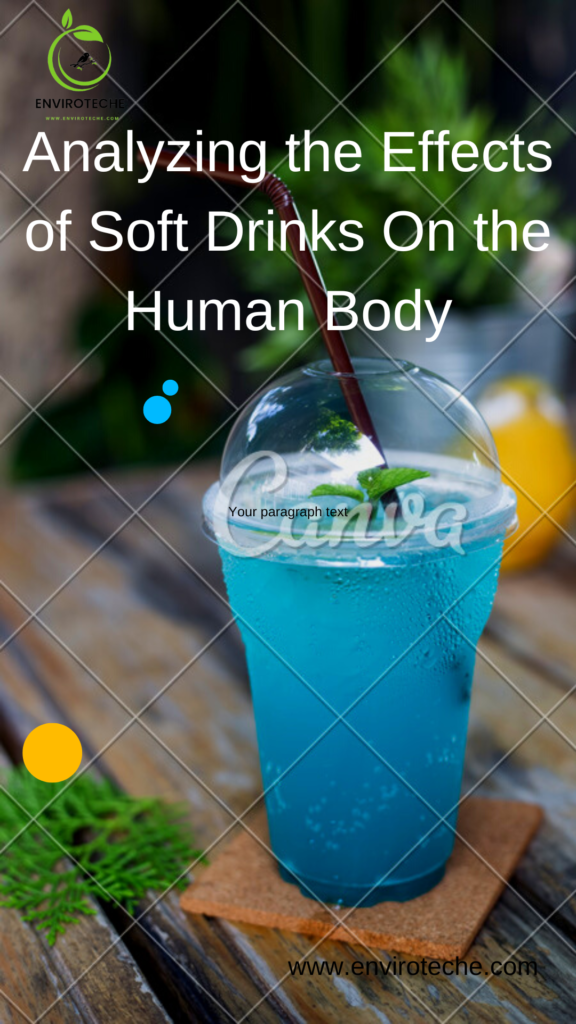Table of Contents

History of Soft Drinks
A British chemist named Joseph Priestley introduced carbonated beverages in the late 18th century, by merging water with carbon dioxide to create carbonated water. The primary and defining ingredient of the majority of soft drinks is his discovery of carbonated water, also known as soda water. In 1884, soft drinks made their debut (Donovan, 2013).
The soft drinks, also called a soda, is a non-alcoholic beverage made mostly of sugar, flavorings, and carbonated water to which carbon dioxide gas has been added. Cola, ale with ginger, ginger beer, a root beer, or a beverage with fruit flavors are all examples of soft drinks. It can be purchased in cans and bottles or poured into a glass at a soda fountain. It has been given the moniker “soft drink” to set it apart from “hard drinks,” as well as alcohol-based beverages.
Ingredients of soft drinks:
Water(up to 98 vol%), sweetener(8–12%, w/v), carbon dioxide(0.3–0.6%, w/v), acidulants (0.05–3%, w/v), flavorings (0.1–5%, w/v), colorings (0–70 ppm), chemical preservatives (within legal limits), antioxidants(100 ppm), stabilizers(0.1-0.2% per GMP), or foamy compounds (the saponins up to 200 mg/mL) are the most common ingredients in soft drinks (Suter et al., 2020).
Impact of soft drinks on human health:
The impacts of soft drinks on the health of humans are as follows:
- Soft drinks and cardiovascular health:
Soft drinks raise the risk of heart disease and lower good cholesterol levels. Beverages with added sugars have been linked to increased triglyceride and cholesterol levels, high blood pressure, and chronic inflammation, all of which are risk factors for heart disease. 70% of cardiovascular diseases are related to obesity which is caused by sugar beverages (Malik & Hu, 2022).
- Effect on dental health:
Soft drink consumption leads to serious dental health problems. Small bacteria that reside in and around teeth develop an acid that allows bacteria to grow and harms tooth enamel when they come into contact with sugar found in soft drinks. This acid eventually causes decay and cavities. Soda drinks can take away all the good parts of your teeth (Ehlen et al., 2008). Cavities eventually appear in those who often consume soft drinks. Young children are at higher risk of developing tooth decay.
- Effect on weight and metabolism:
Soft drinks can have a significant effect on weight and metabolism. The rapid increase in obesity and metabolic syndrome is related to beverage consumption. Adolescents who consume excessive amounts of soft drinks are more likely to become overweight and develop diabetes. Excess body weight can strain the bones and increase the risk of fractures and osteoporosis. Furthermore, it contain caffeine and the long-term effects of caffeine on metabolism can vary from person to person.
- Effect on heartburn and body cells:
The pH of water can be altered by carbon dioxide. As we know:
CO2 + H H2CO3
Carbon dioxide is injected under pressure into water to create carbonated beverages. The pH falls and becomes more acidic and bubbly when additional carbon dioxide is added. When carbon dioxide overloads, it destroys healthy cells. The environment is acidic due to dead cells. Acidity and heartburn are strongly correlated with the consumption.
- Effect on the digestive system:
Too much intake of beverages can cause issues for the digestive system. Drinking carbonated beverages moves more air into your digestive tract, which can cause bloating, burping, or gas which causes digestive discomfort.
Soft drinks are highly acidic, which can irritate the lining of the stomach and the esophagus, potentially leading to acid reflux or heartburn.
- Soft drinks and Dehydration:
When people consume it, they may be less inclined to drink water or other healthier beverages. This can further contribute to dehydration.
- Effect on kidneys:
Particularly phosphoric acid-containing beverages such as colas have been linked to urine alterations that encourage kidney stones. Colas contain high levels of phosphoric acid which has been linked to kidney issues and other kidney problems. The excess phosphoric acid may lead to the development of calcium phosphate stones in the kidneys. Because the kidneys are involved in maintaining the body’s acid-base balance, the excessive acidity of certain soft drinks might upset the pH equilibrium in the body and perhaps have an impact on renal function.
Awareness of soft drinks in public:
Consumption of soft drinks is a public issue and this issue is increasing day by day because the consumption has become a fashion, especially for young people (James et al., 2004). Raising awareness of this issue should begin at home, where parents should inform their kids about the risks of consuming too much of sugar-filled beverages.
The government should advertise the complications one will get due to these drinks. Soft drink has a good taste but it’s not good for human health, people who drink , think that soft drinks relieve them but actually, are damaging them badly.
Do yourself a huge favor, please cut down or stop drinking any form of soft/carbonated
Conclusion:
Soft drinks are a little more harmful than sugar solutions. They contain large amount of sugar which cause lots of problems for human health. There was no nutritional benefit to soft drinks (in terms of vitamins and minerals). They are more acidic, include more sugar, and contain more colorings and preservatives.
People who consume too many soft drinks have large negative effects on their health as compared to those who consume fewer soft drinks. According to the American Heart Association, for men, the recommendation is 150 calories per day or about 37 grams of sugar, and for women intake to only 100 calories per day or about 25 grams of sugar. After reading we can say that too much use can cause serious health problems due to carbon dioxide involution.
Reference:
Donovan, T. (2013). Fizz: How soda shook up the world. Chicago Review Press.
Ehlen, L. A., Marshall, T. A., Qian, F., Wefel, J. S., & Warren, J. J. (2008). Acidic beverages increase the risk of in vitro tooth erosion. Nutrition Research, 28(5), 299-303.
James, J., Thomas, P., Cavan, D., & Kerr, D. (2004). Preventing childhood obesity by reducing consumption of carbonated drinks: cluster randomised controlled trial. Bmj, 328(7450), 1237.
Malik, V. S., & Hu, F. B. (2022). The role of sugar-sweetened beverages in the global epidemics of obesity and chronic diseases. Nature Reviews Endocrinology, 18(4), 205-218.
Suter, R., Miller, C., Gill, T., & Coveney, J. (2020). The bitter and the sweet: a cultural comparison of non-alcoholic beverage consumption in Japan and Australia. Food, Culture & Society, 23(3), 334-346.
Author detail:
Aisha Ghaffar, Tehreem Tahir
Department of Chemistry, University Of Agriculture Faisalabad, Sub-Campus Toba Tek Singh
Check Other Scholarships:

